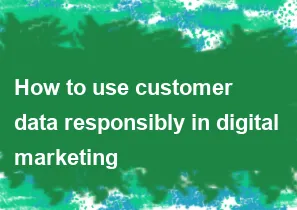How to use customer data responsibly in digital marketing

Using customer data responsibly in digital marketing is essential to build trust, comply with regulations, and maintain a positive brand image. Here are some guidelines to ensure responsible use of customer data:
Transparency:
- Clearly communicate how customer data will be collected, used, and stored. Provide a transparent privacy policy on your website.
- Obtain explicit consent before collecting any sensitive information and allow customers to opt-in or opt-out of data collection.
Data Security:
- Implement robust security measures to protect customer data from unauthorized access, breaches, or theft.
- Regularly update and patch your systems to address vulnerabilities and ensure data integrity.
Compliance:
- Stay informed about data protection laws and regulations, such as GDPR, CCPA, or any relevant local regulations, and ensure compliance.
- Obtain consent from customers before using their data for marketing purposes.
Anonymization and Aggregation:
- Whenever possible, anonymize or aggregate customer data to protect individual identities while still gaining valuable insights.
- Minimize the collection of personally identifiable information (PII) unless absolutely necessary for business purposes.
Limited Data Collection:
- Collect only the data that is essential for your business needs. Avoid unnecessary or excessive data gathering.
- Regularly review and purge outdated or unnecessary customer data to reduce the risk of misuse.
Data Access Controls:
- Limit access to customer data to only those employees who require it for their job roles.
- Implement role-based access controls and monitor user activities to prevent unauthorized access.
Customer Control:
- Provide customers with options to control their data, including the ability to update, correct, or delete their information.
- Respect customers' preferences regarding communication channels and frequency.
Educate Your Team:
- Train your employees on data protection principles and ensure they understand the importance of responsible data handling.
- Establish a culture of data ethics within your organization.
Third-Party Vendors:
- Vet third-party vendors and ensure they adhere to the same high standards of data protection.
- Have clear contracts and agreements in place that outline data handling and security requirements.
Regular Audits and Assessments:
- Conduct regular audits of your data practices and security measures to identify and address any potential issues.
- Perform risk assessments to stay ahead of emerging threats and changes in regulations.
By adopting these principles, businesses can build a foundation of trust with their customers and demonstrate a commitment to responsible and ethical handling of customer data in digital marketing efforts.
-
Popular Post
- How to optimize for Google's About This Result feature for local businesses
- How to implement multi-language support in an Express.js application
- How to handle and optimize for changes in mobile search behavior
- How to handle CORS in a Node.js application
- How to use Vue.js with a UI framework (e.g., Vuetify, Element UI)
- How to configure Laravel Telescope for monitoring and profiling API requests
- How to create a command-line tool using the Commander.js library in Node.js
- How to implement code splitting in a React.js application
- How to use the AWS SDK for Node.js to interact with various AWS services
- How to use the Node.js Stream API for efficient data processing
- How to implement a cookie parser middleware in Node.js
- How to implement WebSockets for real-time communication in React
-
Latest Post
- How to implement a dynamic form with dynamic field styling based on user input in Next.js
- How to create a custom hook for handling user interactions with the browser's device motion in Next.js
- How to create a custom hook for handling user interactions with the browser's battery status in Next.js
- How to implement a dynamic form with dynamic field visibility based on user input in Next.js
- How to implement a dynamic form with real-time collaboration features in Next.js
- How to create a custom hook for handling user interactions with the browser's media devices in Next.js
- How to use the useSWRInfinite hook for paginating data with a custom loading indicator in Next.js
- How to create a custom hook for handling user interactions with the browser's network status in Next.js
- How to create a custom hook for handling user interactions with the browser's location in Next.js
- How to implement a dynamic form with multi-language support in Next.js
- How to create a custom hook for handling user interactions with the browser's ambient light sensor in Next.js
- How to use the useHover hook for creating interactive image zoom effects in Next.js